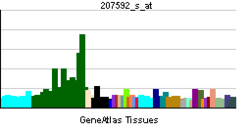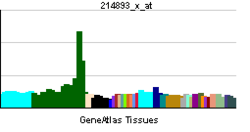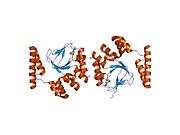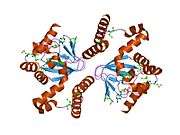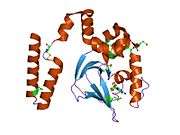HCN2
| View/Edit Human | View/Edit Mouse |
Potassium/sodium hyperpolarization-activated cyclic nucleotide-gated ion channel 2 is a protein that in humans is encoded by the HCN2 gene.[3][4][5][6]
Interactions
HCN2 has been shown to interact with HCN1[7][8] and HCN4.[7]
Function
The function of the channel is not known although its activation by hyperpolarization alludes to the funny channels in the sinoatrial node of the heart (which form the basis of spontaneous generation of electrical rhythm). These channels have recently been associated with chronic pain and blocking the gene is associated with resolution of neuropathic episodes of pain.[9]
See also
References
- ↑ "Human PubMed Reference:".
- ↑ "Mouse PubMed Reference:".
- ↑ Santoro B, Grant SG, Bartsch D, Kandel ER (Dec 1997). "Interactive cloning with the SH3 domain of N-src identifies a new brain specific ion channel protein, with homology to eag and cyclic nucleotide-gated channels". Proceedings of the National Academy of Sciences of the United States of America. 94 (26): 14815–20. doi:10.1073/pnas.94.26.14815. PMC 25120
 . PMID 9405696.
. PMID 9405696. - ↑ Santoro B, Liu DT, Yao H, Bartsch D, Kandel ER, Siegelbaum SA, Tibbs GR (May 1998). "Identification of a gene encoding a hyperpolarization-activated pacemaker channel of brain". Cell. 93 (5): 717–29. doi:10.1016/S0092-8674(00)81434-8. PMID 9630217.
- ↑ Hofmann F, Biel M, Kaupp UB (Dec 2005). "International Union of Pharmacology. LI. Nomenclature and structure-function relationships of cyclic nucleotide-regulated channels". Pharmacological Reviews. 57 (4): 455–62. doi:10.1124/pr.57.4.8. PMID 16382102.
- ↑ "Entrez Gene: HCN2 hyperpolarization activated cyclic nucleotide-gated potassium channel 2".
- 1 2 Much B, Wahl-Schott C, Zong X, Schneider A, Baumann L, Moosmang S, Ludwig A, Biel M (Oct 2003). "Role of subunit heteromerization and N-linked glycosylation in the formation of functional hyperpolarization-activated cyclic nucleotide-gated channels". The Journal of Biological Chemistry. 278 (44): 43781–6. doi:10.1074/jbc.M306958200. PMID 12928435.
- ↑ Proenza C, Tran N, Angoli D, Zahynacz K, Balcar P, Accili EA (Aug 2002). "Different roles for the cyclic nucleotide binding domain and amino terminus in assembly and expression of hyperpolarization-activated, cyclic nucleotide-gated channels". The Journal of Biological Chemistry. 277 (33): 29634–42. doi:10.1074/jbc.M200504200. PMID 12034718.
- ↑ "Gene find may lead to pills that kill chronic pain". The Times Of India. 10 September 2011.
Further reading
- Kleiderlein JJ, Nisson PE, Jessee J, Li WB, Becker KG, Derby ML, Ross CA, Margolis RL (Dec 1998). "CCG repeats in cDNAs from human brain". Human Genetics. 103 (6): 666–73. doi:10.1007/s004390050889. PMID 9921901.
- Ludwig A, Zong X, Stieber J, Hullin R, Hofmann F, Biel M (May 1999). "Two pacemaker channels from human heart with profoundly different activation kinetics". The EMBO Journal. 18 (9): 2323–9. doi:10.1093/emboj/18.9.2323. PMC 1171315
 . PMID 10228147.
. PMID 10228147. - Vaccari T, Moroni A, Rocchi M, Gorza L, Bianchi ME, Beltrame M, DiFrancesco D (Sep 1999). "The human gene coding for HCN2, a pacemaker channel of the heart". Biochimica et Biophysica Acta. 1446 (3): 419–25. doi:10.1016/s0167-4781(99)00092-5. PMID 10524219.
- Hartley JL, Temple GF, Brasch MA (Nov 2000). "DNA cloning using in vitro site-specific recombination". Genome Research. 10 (11): 1788–95. doi:10.1101/gr.143000. PMC 310948
 . PMID 11076863.
. PMID 11076863. - Ulens C, Tytgat J (Mar 2001). "Functional heteromerization of HCN1 and HCN2 pacemaker channels". The Journal of Biological Chemistry. 276 (9): 6069–72. doi:10.1074/jbc.C000738200. PMID 11133998.
- Proenza C, Tran N, Angoli D, Zahynacz K, Balcar P, Accili EA (Aug 2002). "Different roles for the cyclic nucleotide binding domain and amino terminus in assembly and expression of hyperpolarization-activated, cyclic nucleotide-gated channels". The Journal of Biological Chemistry. 277 (33): 29634–42. doi:10.1074/jbc.M200504200. PMID 12034718.
- Qu J, Altomare C, Bucchi A, DiFrancesco D, Robinson RB (Aug 2002). "Functional comparison of HCN isoforms expressed in ventricular and HEK 293 cells". Pflügers Archiv. 444 (5): 597–601. doi:10.1007/s00424-002-0860-7. PMID 12194012.
- Sesti F, Rajan S, Gonzalez-Colaso R, Nikolaeva N, Goldstein SA (Apr 2003). "Hyperpolarization moves S4 sensors inward to open MVP, a methanococcal voltage-gated potassium channel". Nature Neuroscience. 6 (4): 353–61. doi:10.1038/nn1028. PMID 12640457.
- Stieber J, Thomer A, Much B, Schneider A, Biel M, Hofmann F (Sep 2003). "Molecular basis for the different activation kinetics of the pacemaker channels HCN2 and HCN4". The Journal of Biological Chemistry. 278 (36): 33672–80. doi:10.1074/jbc.M305318200. PMID 12813043.
- Bender RA, Soleymani SV, Brewster AL, Nguyen ST, Beck H, Mathern GW, Baram TZ (Jul 2003). "Enhanced expression of a specific hyperpolarization-activated cyclic nucleotide-gated cation channel (HCN) in surviving dentate gyrus granule cells of human and experimental epileptic hippocampus". The Journal of Neuroscience. 23 (17): 6826–36. PMID 12890777.
- Much B, Wahl-Schott C, Zong X, Schneider A, Baumann L, Moosmang S, Ludwig A, Biel M (Oct 2003). "Role of subunit heteromerization and N-linked glycosylation in the formation of functional hyperpolarization-activated cyclic nucleotide-gated channels". The Journal of Biological Chemistry. 278 (44): 43781–6. doi:10.1074/jbc.M306958200. PMID 12928435.
- Michels G, Er F, Khan I, Südkamp M, Herzig S, Hoppe UC (Feb 2005). "Single-channel properties support a potential contribution of hyperpolarization-activated cyclic nucleotide-gated channels and If to cardiac arrhythmias". Circulation. 111 (4): 399–404. doi:10.1161/01.CIR.0000153799.65783.3A. PMID 15687126.
- Akhavan A, Atanasiu R, Noguchi T, Han W, Holder N, Shrier A (Jul 2005). "Identification of the cyclic-nucleotide-binding domain as a conserved determinant of ion-channel cell-surface localization". Journal of Cell Science. 118 (Pt 13): 2803–12. doi:10.1242/jcs.02423. PMID 15961404.
- Calloe K, Elmedyb P, Olesen SP, Jorgensen NK, Grunnet M (Sep 2005). "Hypoosmotic cell swelling as a novel mechanism for modulation of cloned HCN2 channels". Biophysical Journal. 89 (3): 2159–69. doi:10.1529/biophysj.105.063792. PMC 1366717
 . PMID 15980171.
. PMID 15980171.
External links
- HCN2 protein, human at the US National Library of Medicine Medical Subject Headings (MeSH)
This article incorporates text from the United States National Library of Medicine, which is in the public domain.
This article is issued from Wikipedia - version of the 5/20/2016. The text is available under the Creative Commons Attribution/Share Alike but additional terms may apply for the media files.

